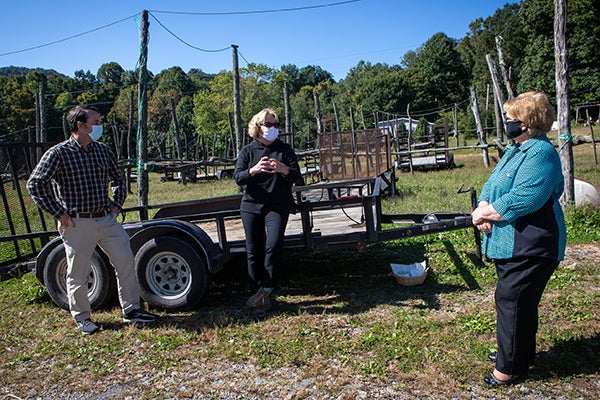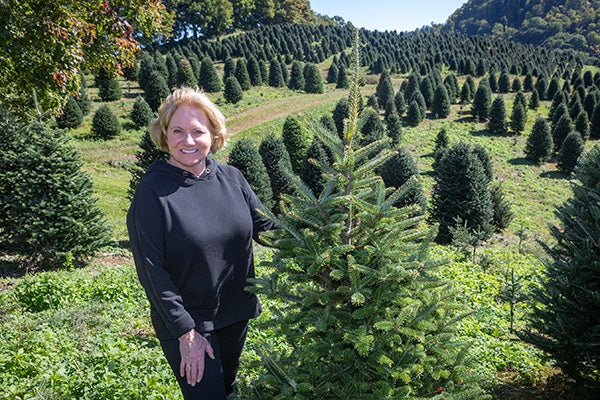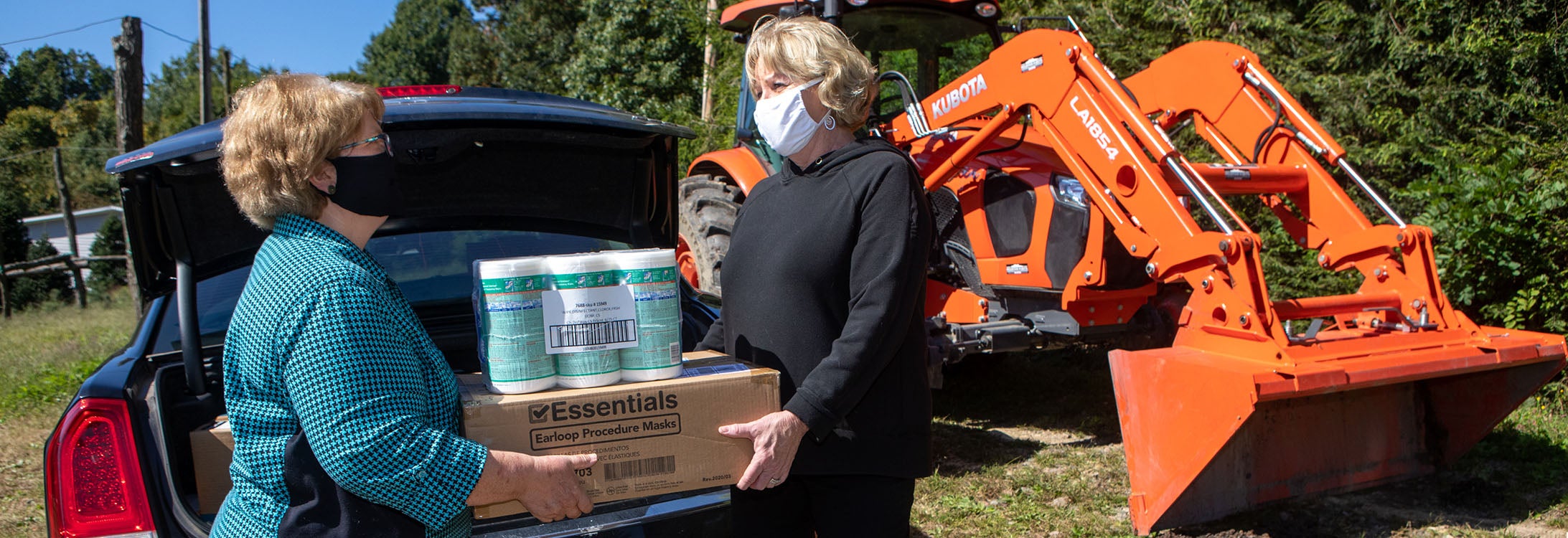PROTECTING FARMERS
NC Agromedicine Institute helping farms stay safe, operational during COVID-19 pandemic
While health care systems around the world were frantically searching for personal protective equipment (PPE) for front-line hospital workers during the early weeks of the COVID-19 pandemic, the North Carolina Agromedicine Institute was doing the same for another group of essential workers – farmers.
During the peak harvest months, there are more than 70,000 seasonal workers on North Carolina farms. They traditionally work, live and travel in close proximity to each other, helping the state’s farms provide consumers with everything from produce and livestock to Christmas trees.
While the crops may differ from place to place, the state’s farms share the common concern of needing to keep their workers safe.
Respirators – such as N95 masks – were not only required attire for many farm workers prior to the threat from COVID-19, but the need for properly fitting masks is so important that the Environmental Protection Agency (EPA) requires farm workers get fit tested for their respirators each year if they work with dangerous chemicals, such as pesticides.
Due to the national PPE shortage, however, available respirators were being redirected to health care workers, which meant farmers did not have enough supplies for their daily operations or fit tests.
“We had no masks and we couldn’t find them anywhere,” said Tracy Taylor, who has owned the Vilas, North Carolina-based Stone Mountain Farms with her husband, Scott, since 1988. “We were on the internet and going to building supply places trying to get PPE and sanitizing materials, and we couldn’t get them because everyone was saying to leave them for the medical staff. We found some online, and the prices were ridiculous.
“Being farmers, we’re a dying breed already. So no matter what you’re growing – produce or something else – farmers are essential too,” Taylor added. “And without masks, we would not have been able to continue functioning.”
Fortunately, the state’s farmers have an ally in the North Carolina Agromedicine Institute – a partnership between East Carolina University, North Carolina State University and N.C. A&T State University that advocates for the health and safety of farmers, fishermen, foresters, their workers and their families through research, prevention/intervention and education/outreach.
“Our growers are very stressed at the idea of work stoppage and trying to figure out what resources are available to protect their workers. We’ve certainly had farms that have had outbreaks and had to cease operations. And when you have a farm that has a work stoppage, that is serious,” said ECU’s Dr. Robin Tutor Marcom, director of the North Carolina Agromedicine Institute.
“They can’t just stop for two weeks and catch up later. Their crop is coming out right now and two weeks later means they’ve lost their crops. So you might not have a farm for those workers to come back to next year,” Tutor Marcom added. “We had to try to help.”
Addressing multiple challenges
The state’s farmers were facing a three-pronged challenge: meeting the respirator fit testing requirements, finding enough PPE to keep their farms operational and acquiring enough PPE and sanitizing supplies to keep their workers healthy during the pandemic.
Tutor Marcom started with addressing the most pressing concern.

(From the right) Tutor Marcom; Taylor; and Dr. Jim Hamilton, Watauga County extension director for the NC Cooperative Extension, discuss the impact COVID-19 has had on the agricultural industry.
“We actually started at the end of February because spring is the time when we would be doing our respirator fit-testing to help the farms comply with the EPA mandates and we were already starting to see a national shortage of PPE and respirator fit testing supplies,” she said. “So, I reached out to the pesticide section of the Department of Agriculture and the EPA and said, ‘We have a problem, because if we can’t get respiratory protection and we can’t get fit testing supplies, then the farmers cannot comply. What are we going to do?”
The regulatory agencies agreed and granted the growers permission not to be required to have annual fit tests this year.
“We began, early on, trying to bring attention to the supply issues our growers were facing and it pretty much evolved from there,” Tutor Marcom said.
The North Carolina Agromedicine Institute received $52,000 in public/private funding, including a $50,000 grant from Phillip Morris, but was able to use its valuable statewide and national connections to bring in additional donations of supplies.
By the beginning of September, the institute had distributed more than $150,000 worth of materials, including masks, non-touch thermometers, gloves and sanitizing wipes.
“We have literally served people from as far east as Brunswick and Pamlico counties all the way up to Ashe, Alleghany and Watauga counties. So we’ve covered the state,” Tutor Marcom said. “We’ve done an incredible amount of work, yet again, on a shoestring budget.”
Medical supply and purchasing specialists at East Carolina University – specifically Jason Beasley in ECU’s Medical Storeroom and Tim Daughtry in Materials Management – helped the institute obtain large quantities of supplies that were unavailable to the farmers and the general public, Tutor Marcom said. And the county extension offices of the N.C. Cooperative Extension – another NC State and NC A&T partnership that connects farmers, agribusinesses and communities with vital research-based information and technology – helped identify farmers across the state who were in need and then helped distribute the supplies to them.
“I can’t tell you how thankful we are to be in position we’re in, to be able to make connections and to have special purchasing arrangements that our farms can’t make on their own or don’t have the money for,” Tutor Marcom said.
Dr. Jim Hamilton, the N.C. Cooperative Extension’s Watauga County extension director, said the partnership between the Cooperative Extension and Agromedicine Institute has been strengthened during the COVID-19 pandemic.
“When I started getting calls from producers letting me know that they couldn’t find their basic PPE for their production purposes, the Agromedicine Institute was the first call I made. I had a feeling that they would have access to resources that we simply do not have, and they delivered,” Hamilton said. “This translates into the value of a farm being able to operate or a farm shutting its doors. Having access to that PPE was invaluable, I don’t think you can put a price on it.”
A path forward
Stone Mountain Farms operates more than two dozen Fraser fir tree farms throughout North Carolina, Tennessee and Virginia. With about one million trees in the ground, Tracy Taylor said her farms provide the Christmas trees for retailers along the entire East Cost and as far west as Colorado. The farm also provides on-site choose and cut services for individual consumers.
This is why the safety of the farm’s 30-50 workers has been the paramount concern at Stone Mountain Farms since workers started returning to the farms in March, Taylor added.
“It is very scary for us and we are taking it very seriously. The most important thing is keeping our employees safe, because without them we’re nothing,” Taylor said. “It would hurt us if we had even one or two people get sick. Hopefully we’d be able to isolate them, because if we had five or more? There’s no way. We wouldn’t be having a harvest this winter.”
The impact of that would be felt far away from Stone Mountain Farms.
“If our workers can’t work, it’s not just us who will be hurting. It’s many thousands of people, because we ship a lot of trees and those people are relying on our trees to help get them through the winter,” said Taylor, adding the demand from retailers was already high due to a lingering nationwide tree shortage.
The Taylors did what they could do on their own – such as requiring twice-daily temperature checks and purchasing additional transportation vehicles, living quarters, port-a-johns, sanitization stations and cleaning supplies – to help keep their workers safe.

With about one million trees in the ground, Taylor said Stone Mountain Farms provide the Christmas trees for retailers along the entire East Cost and as far west as Colorado.
“There will be less men in each house and less men in each vehicle, which means more fuel. So it’s been an expensive year, but we feel like this is the smart thing to do,” Taylor said.
However, it will be the supplies and information that the farm received from the North Carolina Agromedicine Institute and the N.C. Cooperative Extension free of charge, that Taylor said has meant the most.
“The COVID-19 pandemic has been extremely tough for us, as it has been for our fellow growers and anyone in the agriculture business,” Taylor said. “The important information and materials that they shared with us; we couldn’t have gotten ourselves. They gave us a path into this season and helped us keep our farms operational. I honestly don’t have enough words to express how I feel about what the Agromedicine Institute has done for us and to know they’re out there fighting for us. They have been incredible.”
While the Agromedicine Institute and Cooperative Extension have been able to provide some help to the state’s farmers, Tutor Marcom said much more work is needed.
“In addition to the supplies, we are in desperate need of housing. We are looking for organizations, individuals or businesses who may have housing in areas where farm workers are that would be willing to help us with a solution,” Tutor Marcom said. “It’s one thing that we we’re dealing COVID-19 right now, but what we’re very concerned about is how we’re going to plan for next year. Workers will start returning to the state at the end of February and we don’t think we’re going to be out of COVID by then. So that is a huge need that we could use help with.”
Taylor said Stone Mountain Farms is also concerned about next year but is still just hoping to make it through this season without incident.
“No matter what you do for a living, this has been a trying time for all of us,” she said. “So I’m hopeful we’re able to put a smile a person’s face and for a family to come together to enjoy a Christmas tree. Because we all need something to be happy about right now.”
—For information on how to support North Carolina’s farmers, visit the North Carolina Agromedicine Institute’s website.
